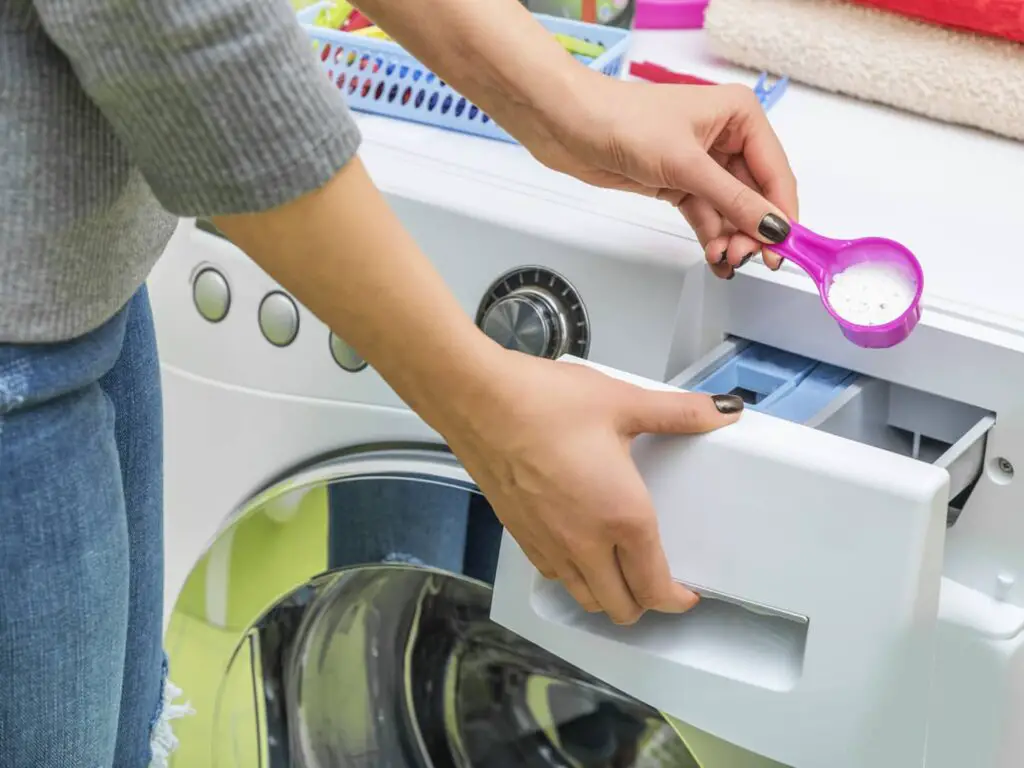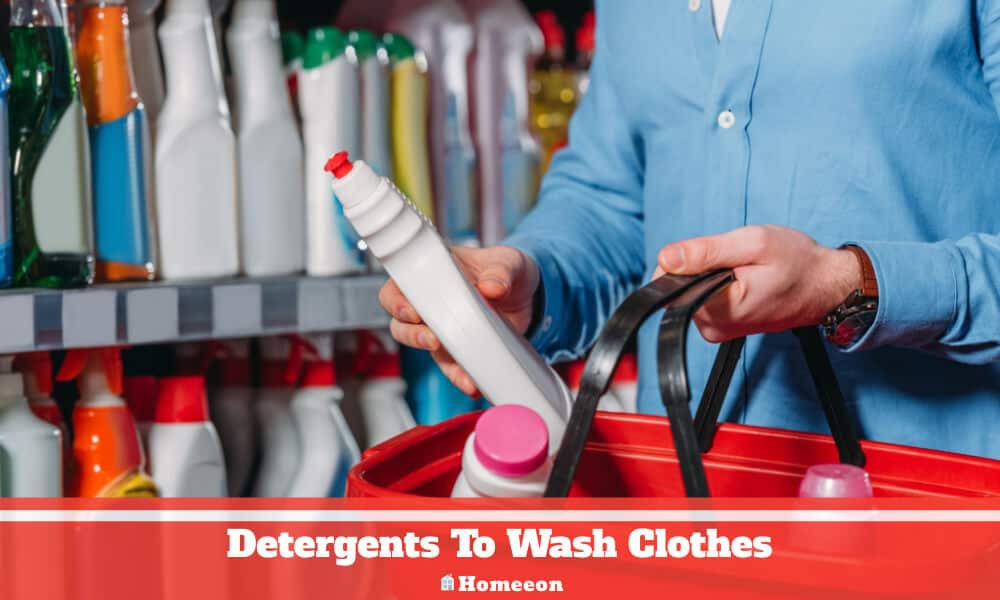Last Updated on August 9, 2023 By Emma W. Thomas
Yes, detergents are essential for effective clothes washing. They remove dirt, oils, and stains, and help water penetrate fabrics. Detergents contain surfactants that break down grime, improving cleaning efficiency and ensuring fresh, clean clothes after each wash.
Can You Wash Clothes Without Detergents? Alternatives To Use

While washing clothes without a detergent may not be so comfortable, it can still be done. You can clean lightly-soiled laundry in plain water and even get the desired outcome. A washing machine’s agitation can also clean the laundry without the need for a cleaning agent. There are also some alternatives that you can use in place of a detergent;
Baking Soda
Baking soda is a suitable substance that you can use instead of detergent and still get your clothes sparkling clean. A cup of baking soda, water, and your washing machine’s agitation is enough to give a load of clean and fresh laundry. Baking soda is a suitable alternative to soaps, especially if you have sensitive skin. It does not have additives that may cause breakouts or itchiness.
Borax
A cup of borax can be useful for everyday laundry if you don’t have or are not willing to use a detergent. The action of water, borax, and the agitation from the washer will give you cleaner clothing than you can imagine. Ensure that when using this product, you pre-treat the stains before washing. It would help if you also had the highest water temperature recommendable for the fabric.
Oxygen-Based Bleaches
Oxygen-based bleaches are also suitable for use as alternatives to soaps. Add half a cup of this powder to an empty washer drum followed by the dirty clothes and water. This substance is an all-fabric, gentle bleach that helps to remove stains and brighten laundry.
It is safe for use on all kinds of fabrics, whether colored or white. Oxygen bleach works slower than chlorine bleach due to its chemical ingredients. The bleaching agent is less damaging to fibers, less corrosive, and also environment-friendly.
Shampoo
Shampoo is among the most common alternatives to laundry detergents. However, avoid using this product in your washing machine as the suds are hard to remove during the machine’s normal rinse cycle. You can use shampoo as a better option when hand-washing your clothes and will easily remove oils and dirt.
Choose a gentle product and apply a small amount in a bathroom sink full of water. You can also use a larger sink or a tub if the laundry is a lot.
Dish-Washing Liquid
This product can also be used as an alternative to laundry detergent in some circumstances. A dish liquid can only be used when hand-washing your clothes and as long as it is not bleached. Ensure that you use a minimal amount of this liquid on your clothes.
Bar Soap
You can use bar soap instead of detergent while washing your clothes by hand. Look for bar soap with no oils to prevent damaging your clothes. Bar soaps can help eliminate stains and clean small items, but it is not suitable for huge laundry.
Natural Laundry Detergents
There are a few alternatives if you desire to clean your laundry with natural other than manufactured products.
Vinegar
Vinegar is an easy natural alternative to laundry detergent. You may use it with your washer to improve the whiteness and brightness of your fabrics. This product has a mildly acidic nature that makes it perfect for stain removal from your clothes. It works well for both white and colored garments, and its pretty potent smell makes it ideal for removing the sour smell.
If your clothes have strong odors, you can run them through a laundry cycle to eliminate the smell. Vinegar also prevents pet hair from sticking to your clothes, which makes it beneficial to pet owners.
Lemon Juice
Lemon juice is an all-natural alternative to detergents that can be used to brighten white fabric. This natural product is perfect for getting rid of stains, mostly rust, mold, and mildew. You can use a mixture of lemon juice to remove mildew stains caused by storing damp towels or clothes.
Make a paste of salt and lemon juice and spread it on the stained parts.
Pros and Cons of Detergents To Wash Clothes
| Advantages | Disadvantages |
|---|---|
| Effective Cleaning | May Cause Allergies |
| Detergents work well in removing dirt, stains, and grime from clothes, making them clean and fresh. | Some people may have allergies or skin sensitivity to certain chemicals present in detergents. It can cause skin irritation or rashes. |
| Widely Available | Environmental Impact |
| Detergents are easily accessible in most stores and come in a variety of types and brands. | Many detergents contain harmful ingredients that can be detrimental to the environment, especially aquatic ecosystems. |
| Versatile Usage | Potentially Damaging to Clothes |
| Detergents can be used in both warm and cold water, and are suitable for hand-washing or machine washing. | Certain harsh chemicals in detergents can reduce the lifespan of clothes, causing color fading and fiber damage. |
| Variety of Fragrances | Can be Expensive |
| Detergents come in an array of scents that help to keep clothes smelling fresh and clean. | Specialized or high-quality detergents can be more costly compared to other laundry cleaning options. |
| Advanced Formulations | May leave Residue |
| Modern detergents often include advanced features like color protection, fabric softeners, or stain-removing enzymes. | Improper use of detergent or problems with the washing machine can lead to residue on the clothes which requires additional rinsing. |
Are Laundry Detergents Different?
Laundry detergents are different, and your choice will depend on your needs. While the detergent brands do not matter, their components may significantly impact your skin and the cleaning outcome. The following factors make a difference in cleaning agents:
Scents
Detergents come in different fragrances, and you can pick what you like. But, if you have sensitive skin, avoid scented products since they are the main skin allergens. There are all-free, clear, and cheer-free detergents perfect for people whose skins are sensitive.
Ensure that the detergent you choose does not have natural cleaning ingredients such as lavender and citrus, as they can also be allergens. Antistatic drier sheets and fabric softeners should also be avoided since they are loaded with scents.
If you have sensitive skin, make sure that you remove all residues from the detergent by rinsing your clothes twice. It would help if you avoided over-packing your washer to ensure thorough rinsing of your laundry.
Stain Removing Properties
Some detergents have better stain-removing power than others. It would help if you looked at people’s reviews about which cleaning detergents work better. Look for a detergent that can work well with both cold and warm water. Your choice should also remove all kinds of stains, whether it is in powder or liquid form.
Efficiency For Use With Washers
If you have a high-efficiency washer, look for a highly effective detergent. Not all detergents work the same with your washers and you need to buy the right product since they produce fewer suds. The machine is also able to rinse out the soap quickly.
A Little Amount For Your Laundry
Some detergents may require you to use a large amount for your laundry, which is not cost-effective. Look for one in which a little amount will go a long way. Washing machines need to use less soap so that it does not get trapped on the clothes.
Laundry Mistakes To Avoid

Sometimes we make mistakes while cleaning our clothes, whether with the way we use detergents, washing machines, or using the wrong products. Below are some errors that we need to avoid;
Using A Lot Of Detergents
Too much detergent can cause excess suds to hold onto the fabric and prevent it from rinsing out properly. A garment that is not appropriately rinsed may have some bacterial build that is not healthy for your skin. Use a little amount for best results,
Rubbing Stains Aggressively
Avoid rubbing the stains too hard as doing this can wear the fabric away and worsen the dirt. Treat the color immediately and dub instead of rubbing while working from the outside to contain the blemish.
Incorrectly Filling The Washer.
If you are using a liquid detergent and a top-loader, start with clothes, followed by water, then soap. Modern detergents are not harmful to clothes since they are phosphate-free. Adding water before clothes can make them float, and hence your cleaning will not be sufficient.
Overusing Bleach
Avoid too much bleach, as this may spoil your fabrics. You may use natural alternatives such as lemon, which will make your clothes brighter and whiter.
Using The Un-Leveled Washing Machine
If you use a washer that is not level, it may produce vibrations that will damage the floor. Vibrations will also wear some components such as shock absorbers and tub bearings prematurely.
Ensure that the feet are screwed up and down properly to level your washing machine.
Conclusion
If you use the right detergent in the right portions and practice the proper cleaning habits, it will leave your clothes clean and smelling fresh. You can also use alternative products instead of detergents for better outcomes, especially if you want to save on costs.
References:
https://www.homesandgardens.com/life-design/can-you-wash-clothes-without-detergent
https://www.areal-lifehousewife.com/2023/05/can-you-wash-clothes-without-detergent.html
Emma is a graduate of Domestic Science or Family and Consumer Sciences (Home Economics) from the University of Wisconsin. She has 7 years of experience Working with the strategic section of BestBuy and now writing full-time for Homeeon.
From Managing the Home, Interiors, Cleaning, and Exteriors to Gardening and everything about Making A Home Liveable – is her passion and this Homeeon is the result of this.
Emma loves decorating her home with the best stuff found online. She cares about quality over anything and writes reviews about them here in Homeeon. Get in touch with her over Pinterest.
Keep reading her blogs.
